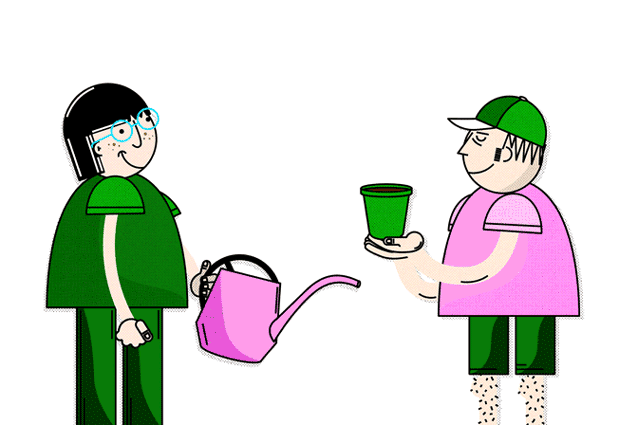How to Avert a Cold War : Family therapists say that many couples find their relationship strained when one partner gets sick and the other becomes a care-giver.
- Share via
When Gary Risner is in top form, he’s able to work 70 hours a week and come home between his day job as an advertising salesman and his night job as a disc jockey with enough energy to cook dinner and provide good company for his wife, Erin.
“When I’m well,” he says, “I’m as nice as can be.”
But when Gary has the flu, he’s a different person.
Once when he felt particularly miserable and Erin was bringing him some water so he could take an aspirin, he refused to drink out of a plastic cup and sent her back to the kitchen for a glass. Another time, he turned away a bowl of soup because Erin had warmed it in the microwave instead of on the stove.
“It’s pretty confusing for Erin when I’m sick,” says Gary, a 25-year-old San Clemente resident. “She doesn’t know when it’s safe to come near me, because I get very moody. I snap at her and say things I don’t mean to say.”
Erin, 24, says she gets impatient with Gary when illness makes him grouchy. But, she admits, she isn’t easy to deal with when she has the flu, either. “I guess I’m demanding when I’m sick,” she says.
Gary agrees. Normally, he adds, “we’re the most loving couple. But when we get sick, it changes things. I become a monster, and she becomes a whiner.”
*
The kinds of conflicts that come up in the Risner household during the flu season are not unusual. Family therapists say that many couples find their relationship strained when one partner gets sick and the other becomes a care giver.
Although those suffering from the flu want to get well without being a burden to others and their loved ones want to be compassionate and giving, it may not be reasonable to expect such model behavior at every stage of an illness that makes life difficult for the entire family.
However, therapists say, couples can prevent frustration, irritation and anger from coming between them when flu strikes by talking in advance about how each partner reacts to illness, what their needs are when they’re sick and what they can realistically expect from the one who is doing the care giving.
As Irvine psychologist Zena Polly points out, it also helps to understand one of the basic truths about modern life: Most of us don’t have time to be sick, and when we do come down with something, we often push ourselves instead of getting the rest we need. Then we get upset when the flu drags on, and doctors with all the tools of high-tech medicine at their disposal are unable to offer an instant cure.
“We don’t have a lot of patience,” Polly observes. “We expect everything to be accomplished quickly, and the flu puts us smack up against the sense of not being in control. You can’t hurry it up.”
This impatience causes some people who have the flu to become so testy that they make it difficult for loved ones to be sympathetic. Often, Polly notes, those who are grumpiest when they get sick are “competent, accomplished people who are real uncomfortable being in a dependent role.”
Loved ones can help this type of patient feel more in command--and less irritable--by encouraging him or her to do small tasks while getting bed rest. Polly suggests cleaning out a briefcase, paying bills or updating an address book, for example.
“Do things that are real low demand but give you a sense of accomplishing something.”
Helen Greenblatt, a Laguna Hills psychotherapist, has another remedy for the type of person who is always in charge and considers everyone else’s needs before his or her own: She assures this patient that it’s OK to stop watching over the rest of the world for a while and concentrate on getting well.
Notes Greenblatt: “I say, ‘Take off your halo now and just be a real person,’ ”
*
Those who are trying to care for someone who has a hard time asking for or accepting help may feel unwanted or unappreciated, but they probably have it easier than the care-givers who are constantly in demand.
People who are worriers by nature may cancel all appointments at the first sign of illness and expect their spouse or “significant other” to do the same. Greenblatt says these people may become preoccupied with their aches and pains--”they tend to take their temperature several times a day, and they’re always looking for symptoms”--and they’re likely to make use of a full spectrum of over-the-counter medications as well as such home remedies as chicken soup or hot tea with a shot of whiskey.
Although these patients may come across as hypochondriacs, Greenblatt says it’s important for care-givers to take them seriously.
“Don’t laugh at their suggestions, no matter how ridiculous they are,” she says. “Listen to them and minister to their needs. They need to feel that they’re being taken care of.”
On the other hand, care-givers mustn’t let a patient like this cause them to become overly anxious themselves--or run them ragged.
“Sometimes the caretaker uses up his or her energy, doesn’t get proper sleep and ends up getting sick,” Greenblatt cautions.
Care givers shouldn’t feel guilty about taking time for themselves, she adds.
“You don’t have to clear your calendar to take care of a person who is mildly ill,” she says.
Patients who worry too much will be reassured to see the people around them going on with their normal routines as much as possible.
“It gives them a sense of continuity and keeps them in the real world,” Greenblatt says.
*
Some care-givers find themselves being driven out of the house by what Polly calls the “patient from hell,” someone who is “ill-equipped to cope with adversity and does not tolerate physical pain or discomfort.”
This patient is prone to angry outbursts and chronic complaints and should be given “lots of space,” Polly advises. “Put some juice on a tray, bring them some magazines and videos and say, ‘I’ll be back in a couple of hours to check on you.’ ”
Greenblatt urges care-givers to use these breaks to share their frustrations with supportive friends.
“Most of us like to cover up our weaknesses and don’t like to be complainers, but stifling all of this isn’t healthy,” she says.
Sometimes, the conflicts that come up between couples when one partner has the flu grow out of the care-giver’s emotional responses to illness rather than the patient’s difficulties.
For example, Greenblatt notes, some people get hostile when their mate gets sick; they may even blame their partner’s behavior for the illness, claiming this wouldn’t have happened if he or she had been eating better or getting more rest.
The anger that care-givers irrationally direct at sick loved ones may grow out of fear, particularly if the patient is elderly, Greenblatt notes.
“Playing ‘what if’ can be very scary for the well person,” she says.
*
Some care-givers have a hard time being as supportive as they’d like because their partner’s illness upsets the equilibrium in their relationship, observes Polly, the Irvine psychologist.
If the person who is sick happens to be the partner who normally does most of the nurturing in the relationship, the care-giver may feel emotionally unsettled because he or she has lost a vital source of support, Polly says.
Kristine Jablonski, a certified psychiatric nurse therapist in Placentia, can relate to that. An outgoing, take-charge type who spends her workday nurturing others, Jablonski looks forward to the caring she gets from her sensitive, attentive husband.
“I really hate it when he’s sick,” she says. “He’s the one person I can really let down with. So when he’s down, it makes me feel angry because I’m afraid I’m not going to be able to get my needs met. Because I’m a grown-up, I can understand that and try not to act on it, but the child in me is saying, ‘What do you mean you can’t take care of me?’ ”
Polly points out that some people who depend on their mate for nurturing are not skilled as care givers themselves and therefore may not be very good at anticipating a sick person’s needs.
“Don’t assume that if your partner was really concerned about you he or she would just know when want your pillow fluffed or when you need a change of scenery or some clean pajamas,” Polly says. “Let your partner have a chance at being successful at this by giving some hints instead of hoping he or she will automatically be able to step into a role that’s unfamiliar.”
*
Karen Cladis, a Corona del Mar resident who is working as an intern for a family therapist in Irvine, says she and her husband, Joe, are both good at asking for what they need when they are sick.
Most of the time, however, they are able to anticipate each other’s needs because they’ve done a lot of communicating in their 10 years of marriage. After helping each other through many flu seasons, they have also learned to respect the differences in the way they confront illness.
Both recently recovered after a month of struggling with the flu. It was a difficult period because both kept working and had little energy left when they came home. They hated being “couch potatoes” and particularly missed the exercise they depend on for relief from stress. But their battle with the flu never became a source of conflict in their relationship.
“We took turns taking care of each other,” Karen says.
She has learned that her husband likes to be left alone when he’s sick, so she doesn’t make any demands on him and lets him rest when he needs to. When it’s his turn to be the care-giver, he keeps the house clean and takes care of other practical matters, provides a lot of extra nurturing--and listens.
“I’m more of a complainer when I’m sick,” Karen says. “I get more down about it. Joe lets me go on and on about how frustrated I am. Then he’ll be real supportive and say, ‘You’ll be OK soon--it’s just the flu,’ and that makes me feel a lot better.”


